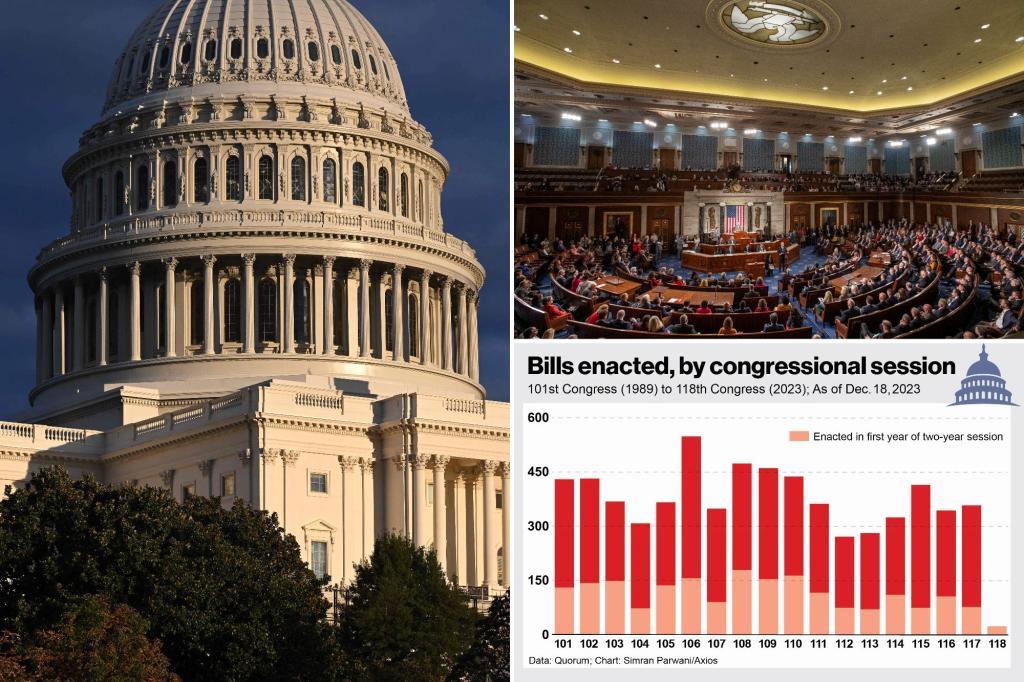It was a small Congress this year.
The House and Senate passed the fewest laws in more than two decades in 2023, putting the 118th Congress on track to be one of the least productive in modern history, Axios reported Tuesday.
Only 24 bills had cleared both chambers as of Monday — the fewest since at least the 101st Congress in 1989, according to data obtained from analytics firm Quorum.
Four of the bills have yet to be signed into law by President Biden. Many are related to continued government funding or have broad support from Republicans and Democrats.
Between 1999 and 2001, the 106th Congress enacted the most legislation in the past three decades, with 550 bills being voted on.
The 108th Congress also passed 180 bills in 2003, the most during the first year of a legislative session during the same period, Quorum found.
Congress in 2023 passed the fewest laws in decades, and as it heads into its second session is on track to be one of the least productive in modern history, Axios reported Tuesday. AFP via Getty Images The 118th Congress has passed just 24 bills as of Monday — the fewest at least since the 101st Congress in 1989, according to data obtained from analytics firm Quorum. Rod Lamkey/CNP/SplashNews.com
The first half of the 118th Congress saw the House majority change hands from Democrats to Republicans and the continuation of a small Democratic majority in the Senate.
The 104th, 112th and 113th Congresses passed nearly three times as many bills even though Republicans controlled at least one chamber under Democratic Presidents Bill Clinton and Barack Obama.
During the 117th Congress, Biden signed large legislative packages such as the bipartisan $1.2 trillion infrastructure bill and the $437 billion Inflation Reduction Act, whose climate-focused provisions were fiercely opposed by congressional Republicans.
The first half of the 118th Congress saw the House majority change hands from Democrats to Republicans and the continuation of a small Democratic majority in the Senate. MICHAEL REYNOLDS/EPA-EFE/Shutterstock House GOP leadership blames Biden and Senate Majority Leader Chuck Schumer (D-NY) for congressional gridlock.
The president also faced opposition from Senator Joe Manchin (D-WV), who as one of the swing votes in the upper chamber attacked a larger version of the Inflation Reduction Act over concerns it would increase inflation.
However, in a divided 118th Congress, upheaval in the Republican House conference often blocks legislation in the lower house, and whatever bills pass often languish in the Democratic-controlled Senate.
Eight GOP lawmakers, led by Rep. Matt Gaetz (R-Fla.), ousted former House Speaker Kevin McCarthy (R-Calif.) on Oct. 3 after a September fight over government funding and alleged backroom deals with Biden and Democrats.
Eight GOP lawmakers led by Rep. Matt Gaetz (R-Fla.) also ousted former House Speaker Kevin McCarthy (R-Calif.) on Oct. 3 after a September fight over government funding. Rod Lamkey/CNP/SplashNews.com
The historic move sparked a three-week search for a new speaker before GOP members unanimously chose Mike Johnson (R-La.) to lead the House.
The House also impeached three representatives — Reps. Adam Schiff (D-Calif.), Rashida Tlaib (D-Mich.) and Jamaal Bowman (D-NY) — and fired Rep. George Santos (R-NY) a liar for fraudulent campaign financing.
Some furious Democrats suggested Tuesday that the GOP infighting was a deliberate decision to stall legislative discussions.
The historic move sparked a three-week search for a new speaker before GOP members unanimously chose Louisiana Republican Mike Johnson to lead the House. Reuters
“But they fired a Speaker and fired a member. Don’t take this Historic victory away from them,” Rep. Jared Moskowitz (D-Fla.) said of his fellow House Republicans in response to Quorum’s findings posted on X.
The House GOP leadership blamed Biden and Senate Majority Leader Chuck Schumer (D-NY) for the congressional impasse.
“House Republicans have led the way with solutions on every issue — passing more regulatory bills than House Democrats with one party control in the first year of the 117th Congress — even as the Senate and the President continue their tactics of refusing to take up our bills for fix a crisis of their own making,” Majority Leader Steve Scalise (R-La.) said in a Dec. 14 statement.
Categories: Trending
Source: thtrangdai.edu.vn/en/



